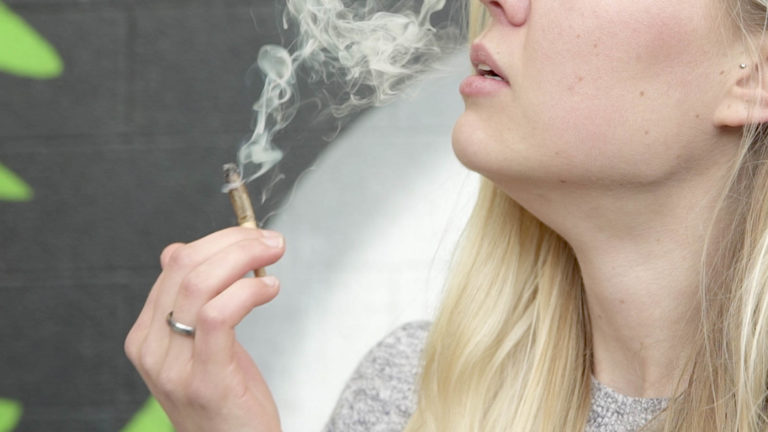As embarrassing and annoying as it can be, coughing is a common byproduct of smoking weed. Here you'll learn why smoking weed makes you cough and what you can do about it.
Why does weed smoke make you cough?
Coughing when smoking weed has a clear anatomical explanation, according to Dr. Melanie Bone, a board-certified OB-GYN and cannabis specialist. As she explained, “Coughing is technically a protective mechanism for the lungs and the tubes bringing air down to them, to open themselves and expel irritants.”
 Photo by: Gina Coleman/Weedmaps
Photo by: Gina Coleman/WeedmapsImage lightbox

In a sense, coughing is the body's natural way of ridding the lungs of harmful materials. A modest degree of coughing, then, should not be reason to panic. A persistent coughing fit may, however, be an indication that you should take a break from smoking. That doesn't mean you need to forego cannabis altogether. If a frequent weed smoke cough is bothersome, try an oral or topical form of cannabis to enjoy many of the same potential benefits.
Does coughing make your high more intense?
It is a common myth that coughing can make your high more intense. But the two are not related, said Dr. Bone. “Another common error is to hold the smoke or vapor deep in the lungs for longer to try to get higher. It is as effective to inhale and exhale without that extra deep drag in,” she said.
Some people think they are taking in more psychoactive THC by holding the hit longer. But THC is absorbed very quickly by the lungs, in as little as a few seconds after inhalation. If you do feel a bit different or lightheaded from holding your drag, it is more likely that your brain is not receiving enough oxygen. This temporary decrease in oxygen does not correlate with a high but with a need to exhale and breathe normally.
In addition, inhaling and holding for an extended time may mean that you are taking in more smoke rather than cannabinoids. The more smoke you inhale, the more likely you are to experience coughing fits. Therefore, trying to cough to get higher is a double whammy, as you will probably not achieve that goal. Rather, you will take in more smoke, producing an unpleasant domino effect of coughing.
What can you do to avoid coughing?
A slight degree of coughing may be a natural effect of smoking marijuana. “Few marijuana smokers or vapers escape coughing, be it an occasional mild cough or a deep hack-up-part-of-your-lung cough,” according to Bone.
However, there are some ways to try to reduce the occasional cough associated with smoking marijuana. Dr. Bone shared the following tips:
- Consume natural cannabis products. Beware of weed containing added ingredients that can cause irritation. Traces of solvents remaining in vapes and added terpenes to enhance the product's smell and effect are the primary culprits. Opting for the most natural and un-doctored products will be gentler on the lungs.
- Experiment with inhalation techniques. Inhalation techniques can be pertinent because the longer smoke or vapor comes into contact with your throat tissues, the greater the chance you'll experience irritation. Inhaling directly without hesitation is a more efficient method.
- Drink fluids: A glass of water or cup of herbal tea can help move residual particles out from the throat down to the stomach. This can be accomplished with lozenges or hard candy as well.
 Photo by: Gina Coleman/Weedmaps
Photo by: Gina Coleman/WeedmapsImage lightbox

The bottom line on weed and coughing
Mild coughing while smoking cannabis may not be cause for major concern. Dr. Bone pointed out that coughing is a protective mechanism that we shouldn't try to stop. To avoid coughing entirely, consider a different way of consuming cannabis such as tinctures, capsules, and edibles. Otherwise, accept the occasional coughing fit as a normal part of a stoned existence and keep a glass of water nearby.

